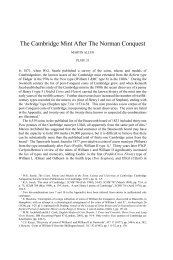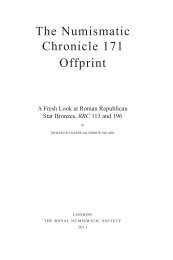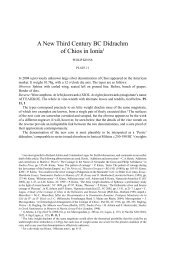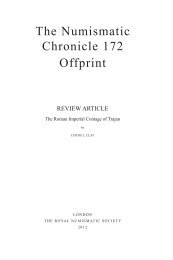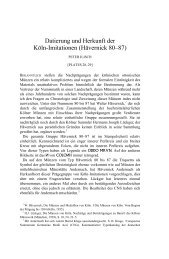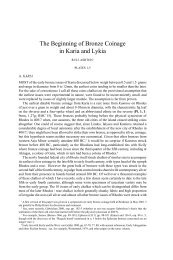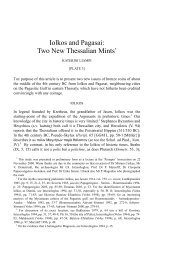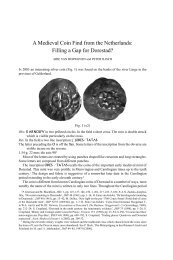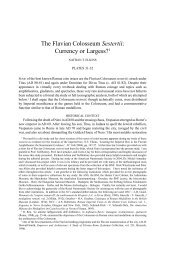The Numismatic Chronicle 171 Offprint - Royal Numismatic Society
The Numismatic Chronicle 171 Offprint - Royal Numismatic Society
The Numismatic Chronicle 171 Offprint - Royal Numismatic Society
You also want an ePaper? Increase the reach of your titles
YUMPU automatically turns print PDFs into web optimized ePapers that Google loves.
386<br />
FRANÇOIS THIERRY<br />
<strong>The</strong> fi rst part of the inscription is a variant of the famous expression ‘May the<br />
state be rich and the people well’ (guo fu min kang 國富民康), which appears in<br />
the Seven Principles (Qi qi 七啟) by Cao Zhi. 119 In this text, Cao Zhi presents a<br />
Confucian who tries to convince a Taoist to abandon his retirement in order to put<br />
his high ideals into practice and thereby make his country powerful. <strong>The</strong> fi rst four<br />
characters on this coin are taken from a passage in Chapter 14 of Shanchuanshen<br />
山川神, in the Meng Liang lu 夢梁錄 (1214) by Wu Zimu 吳自牧 of the Southern<br />
Song dynasty: ‘First ask Heaven for the country to be calm, then keep the people at<br />
peace’ (shang qi guo tai, xia bao min an 上祈國泰,下保民安). 120 <strong>The</strong> second part<br />
is an extremely common phrase, taken from the Treatise on Rites and Ceremonies<br />
(Liyizhi 禮儀志) in the History of the Tang (Tangshu 唐書). 121 It is based on a passage<br />
in <strong>The</strong> Six Strategies (Liu Tao 六韜), a text from the Warring States period (fourth<br />
to third centuries BC) which became a classic of military strategy during the Three<br />
Kingdoms and during the Tang dynasty. When King Wu 武 of Zhou 周 questioned<br />
Prime Minister Jiang Taigong 姜太公 on military strategy and tactics, he replied:<br />
‘It is because the wind and rain arrived at a favourable moment that the fi ve grains<br />
matured in abundance and that the territory of the State is at peace’ (shi gu feng yu<br />
shijie, wu gu feng shu, sheji anning 是故風雨時節,五穀豐熟,社稷安寧). 122 <strong>The</strong><br />
same phrase, albeit reversed, is also seen in the poem Ode on Lychees (Lizhi tan 荔<br />
枝嘆) by Su Shi 蘇軾 (a.k.a. Su Dongpo, 1037–1101): ‘with rain benefi cial and wind<br />
gentle all the grains matured, the people know not famine nor cold which is a happy<br />
omen for the ruler’ (Yu shun feng diao bai gu deng, min bu ji han wei shang rui 雨順<br />
風調百穀登,民不饑寒為上瑞).<br />
28. 華封三祝,天保九如 Hoa phong tam chúc, Thiên bảo cửu như<br />
Ch. Hua feng san zu, tian bao jiu ru // <strong>The</strong> three desires of Hua, the Nine Comparisons<br />
in [the poem] Tianbao.<br />
Inscription found on coins of the Minh Mạng123 era. This type was dropped from the<br />
time of Thiệu Trị because it contained the taboo character Hoa 華 which was present<br />
in the personal name of the emperor’s mother (see above).<br />
<strong>The</strong> fi rst part of the inscription comes from Zhuangzi: ‘When Yao was inspecting the<br />
land of Hua, the offi cial appointed to this fi efdom said, ‘Longevity, wealth and many<br />
sons, these are what the people desire.’ (Yao guan hu Hua. Hua feng ren yue: […]<br />
shou fu duo nanzi, ren zhi suo yu ye 堯觀乎華。華封人曰:[…] 壽富多男子,<br />
also amulets which have just one of four-character phrases (ZGHQ, nos 365, 515), or one of them in<br />
association with another (ZGHQ, nos 675, 876; Lockhart, Glover collection, no. 1843).<br />
119 <strong>The</strong> poet Cao Zhi 曹植 (192–232) was the son of the warlord Cao Cao who was responsible for the<br />
foundation of the Wei kingdom, of the Three Kingdoms.<br />
120 Ciyuan, p. 454.<br />
121 Tangshu, XXI, p. 822.<br />
122 Long tao-IV, Chinese Text Project. See also type 34.<br />
123 Lacroix, Numismatique annamite, no. 418; Schroeder, no. 131; CMV, no. 1534; Barker, Historical<br />
cash coins of Viêt Nam, no. 141.



